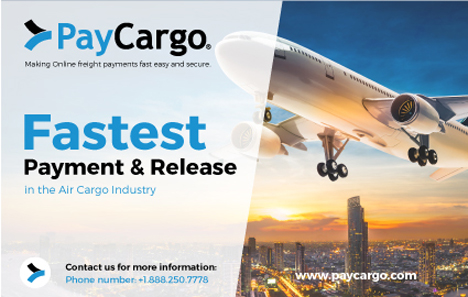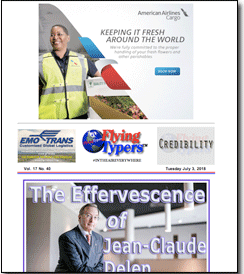|

“Multimodal
2018” was a very worthwhile, really big show and conference.
Now in its 11th year, this year’s edition was held at
the Birmingham NEC, May 1-3, 2018. In the general sweep of the 2017
first half conference slate, you may have missed it.
 The effects of disruptive new
technologies in logistics and developments arising from modal shift
were on the agenda.
The effects of disruptive new
technologies in logistics and developments arising from modal shift
were on the agenda.
For the record, Multimodal 2018
attracted over 9,000 specialists.
Workshop and seminar programs
featured speakers gathered from every mode of transportation alongside
hundreds of exhibitors from leading logistics companies.
One panel featured the always
cool and very straight-to-the-point Tristan Koch, Managing Director
Cargo – Europe, Africa, Middle East and Indian subcontinent
for American Airlines Cargo.
Here, Tristan shares some additional
thoughts with far-reaching global impact from the session titled “Developing
Key Performance Indicators (KPI).”
FlyingTypers:
What are your views on the impact and importance of KPIs?
Tristan Koch:
We all agree on the need for what might be termed proper
end-to-end data to make decisions. The problem in the past has been
the definition of end-to-end. It isn’t enough for these small-scale,
vested interests in one part of the supply chain to share data among
themselves. Industry standard KPIs—where every part of the chain
can benchmark itself against the next in a transparent way—are
clearly the way forward. That's the primary reason for supporting
CargoIQ.
CargoIQ members working together
to define the processes behind air cargo, measure success, and continuously
improve the value of airfreight for customers will drive its success
in the future. So for me, it is a hugely important step forward in
the ongoing development of this industry simply because it helps level
the playing field.
FT: How
broad has the search been in developing KPIs in terms of shippers
and service providers?
Tristan Koch: We
at American have been active in the CargoIQ project. It must be driven
by a global industry body like IATA in order to achieve its goal and
to gain important credibility, which makes all players want to participate.
That includes shippers, forwarders, airlines and manufacturers.
The collaboration between all
members has produced these commitment KPIs that will allow us all
to speak the same language moving forward—something that has
been sorely lacking in this industry. Individual shippers and service
providers have long had their own standards and that’s something
to be applauded. But overall leadership and commonality for the industry
was always lacking. That’s where CargoIQ comes in.
FT: What
value has this initiative added to your overall effort? What is expected
value in future?
Tristan Koch: In
real terms, it provides consistency and shows the level of trust apparent
within all parts of the end-to-end process. That means we can use
CargoIQ as an important benchmarking tool for our day-to-day operations.
It’s already being used
by all of our top forwarder customers and we are encouraging others
to get on board. It allows us to compare our performance against what
our forwarders ask of us, and also to compare ourselves against our
competitors. Our sales team can also use it for reporting purposes,
so it has a real practical benefit.
To continue adding value, we participate
in the bi-annual working group meetings and have participants in both
the Smart Data working group and the Training Tools and Materials
task force to ensure that they can deliver for everyone.
FT: Do
you have some ideas for what should come next?
Tristan Koch:
That’s always a hard one. This industry as a whole
has a bit of a reputation for starting projects and then not seeing
them through to conclusion. So I think the first thing is to continue
supporting CargoIQ in its efforts to create a set of standardized
KPIs. As we discussed in our session in Birmingham, there are always
going to be some anomalies. But it’s about getting the general
principle right, because that's what gives you the base to move onto
the next level.
Geoffrey |




 Vol.
17 No. 39
Vol.
17 No. 39

 The effects of disruptive new
technologies in logistics and developments arising from modal shift
were on the agenda.
The effects of disruptive new
technologies in logistics and developments arising from modal shift
were on the agenda.
 Air
Cargo News FlyingTypers reserves the right to edit all submissions
for length and content. All photos and written material submitted to
this publication become the property of All Cargo Media.
Air
Cargo News FlyingTypers reserves the right to edit all submissions
for length and content. All photos and written material submitted to
this publication become the property of All Cargo Media.